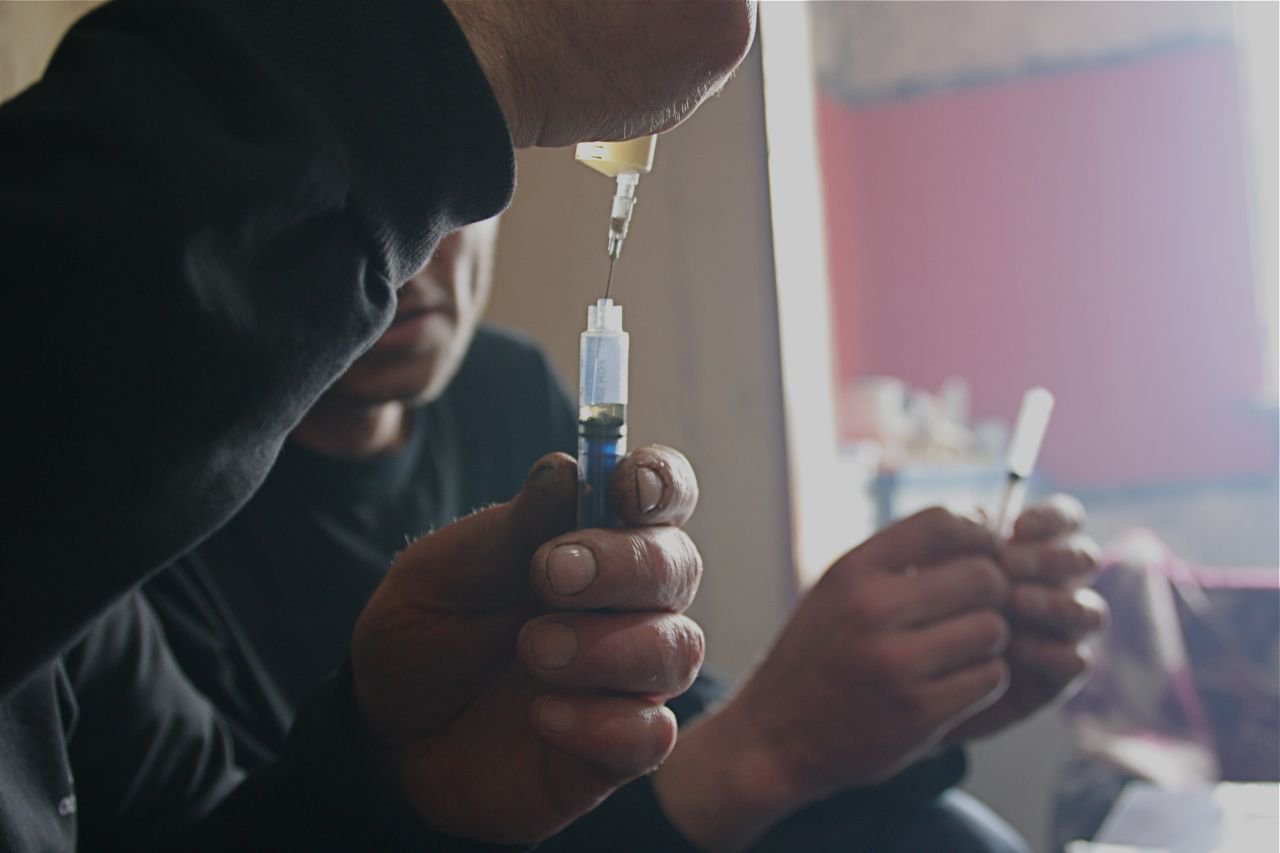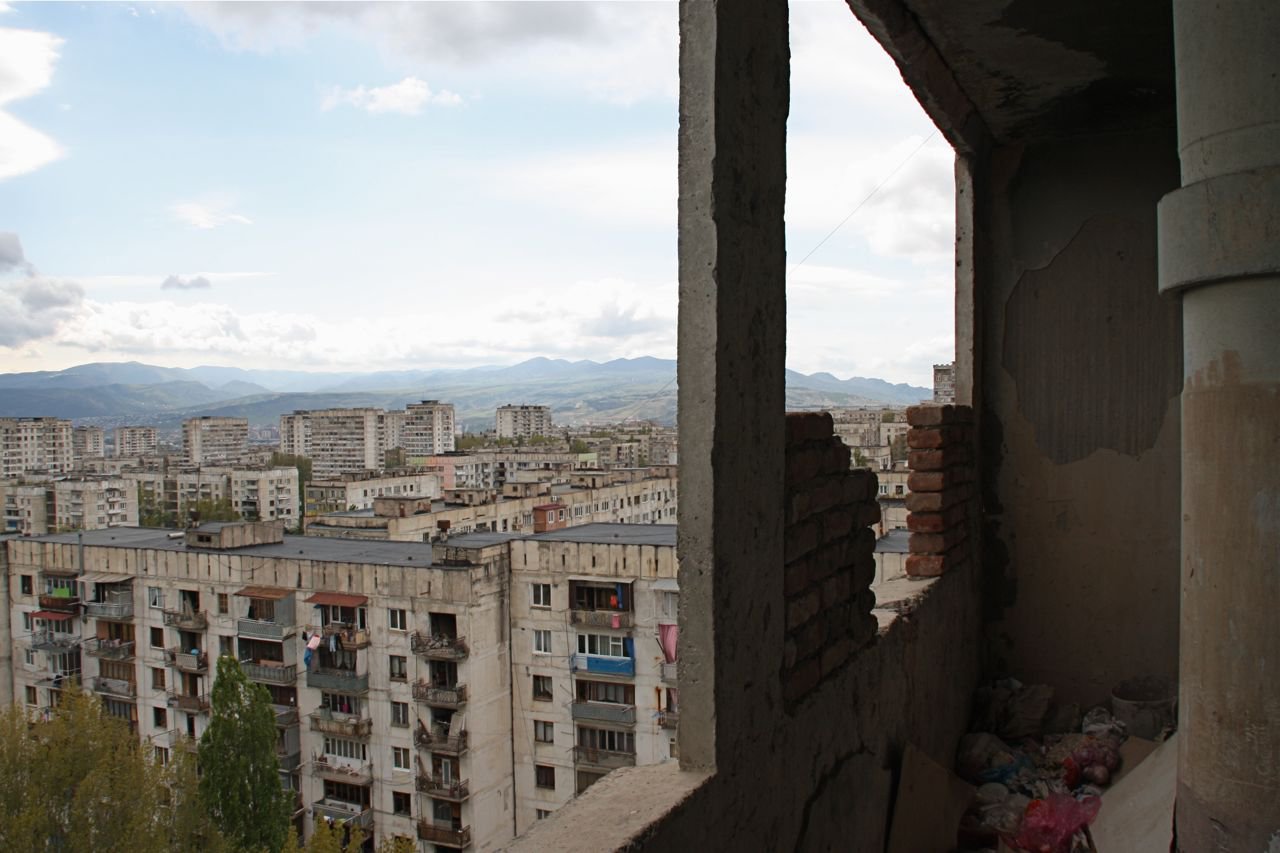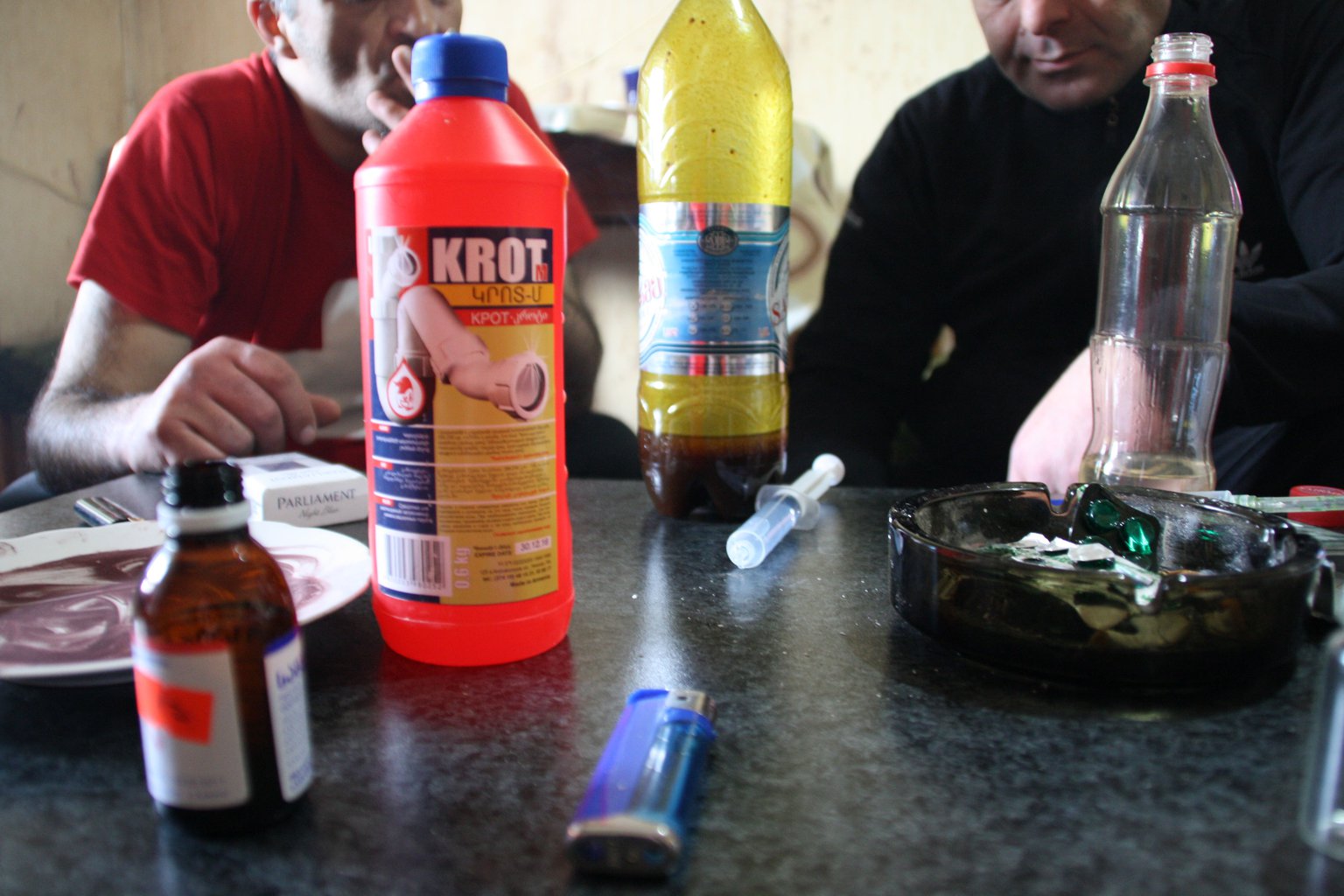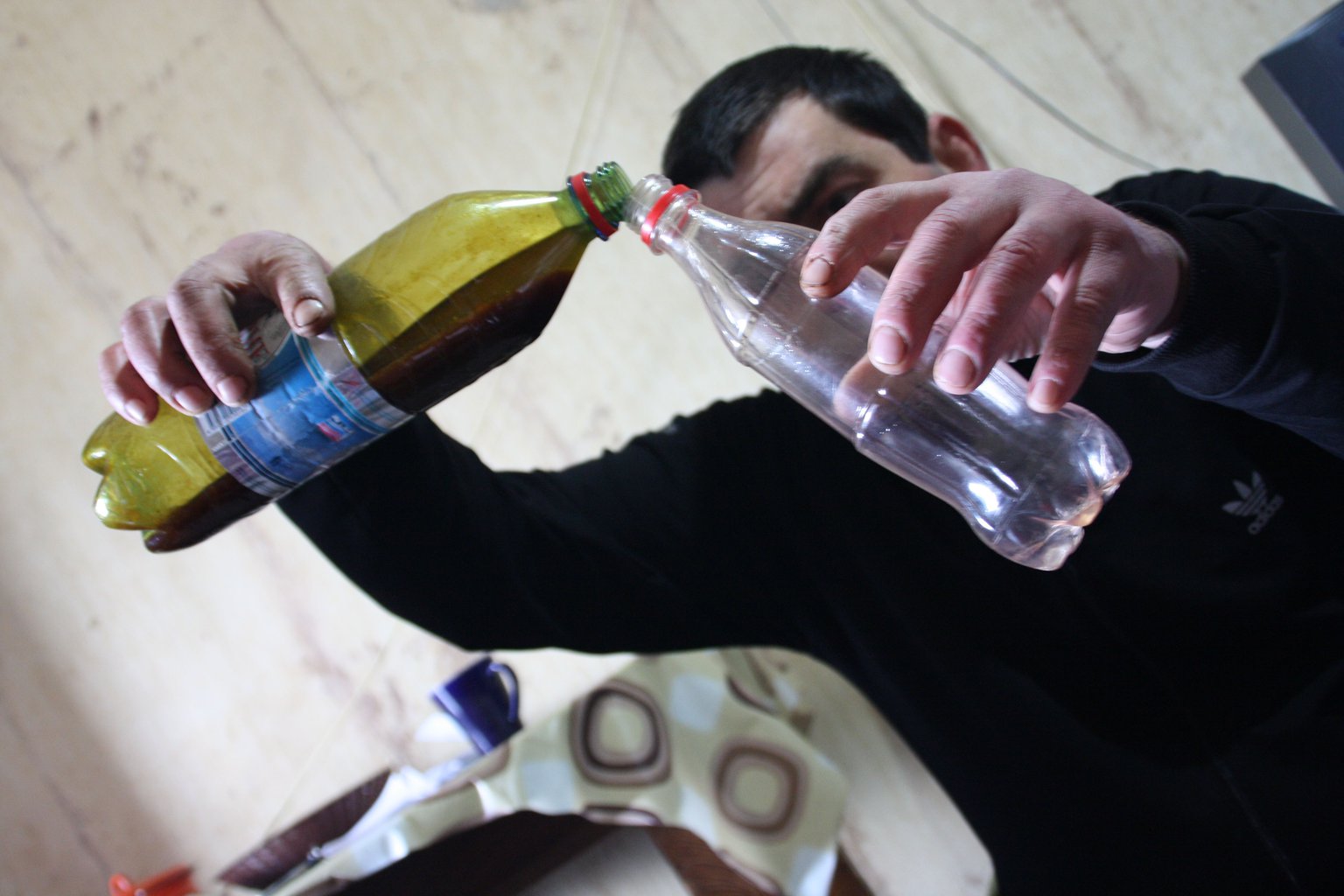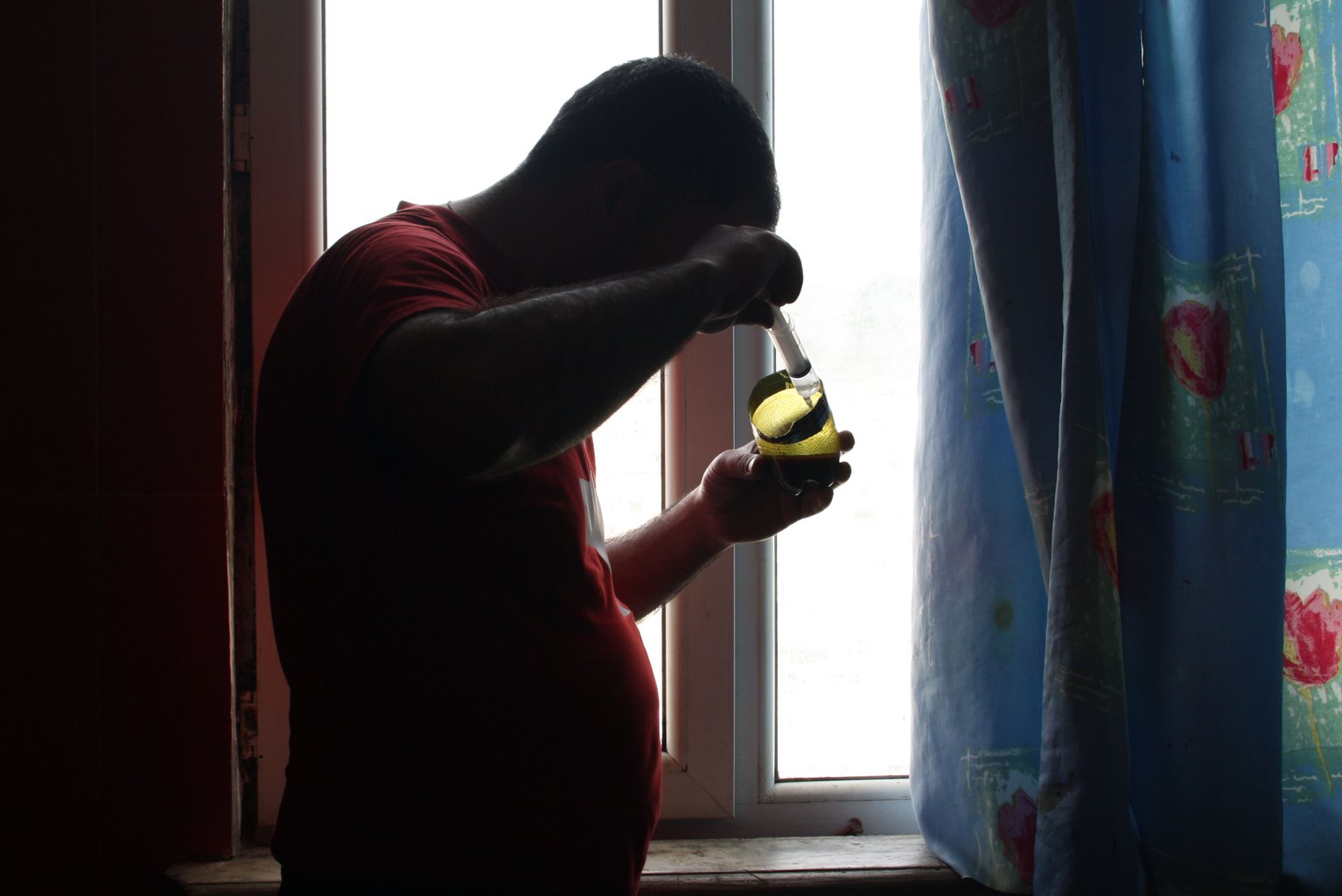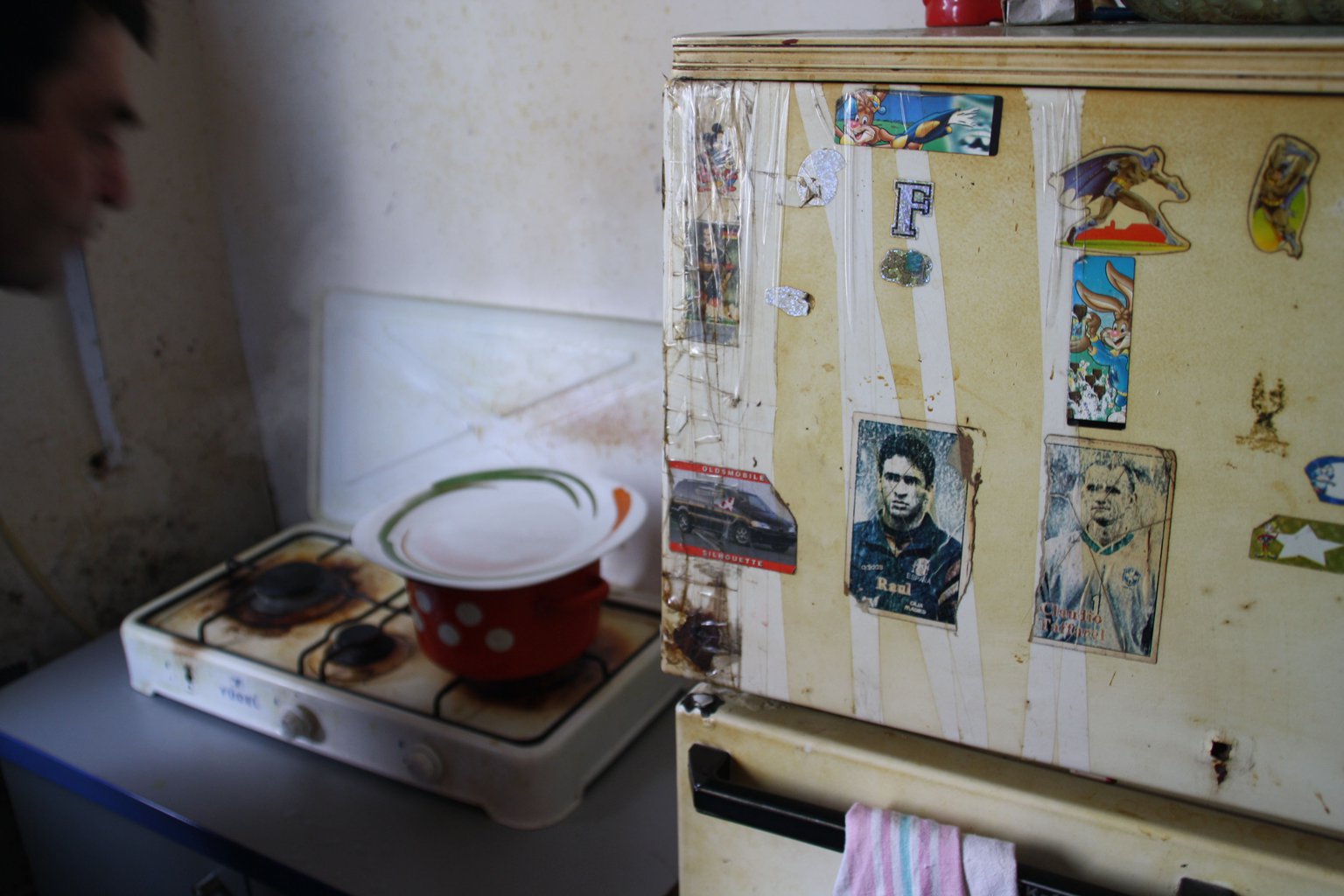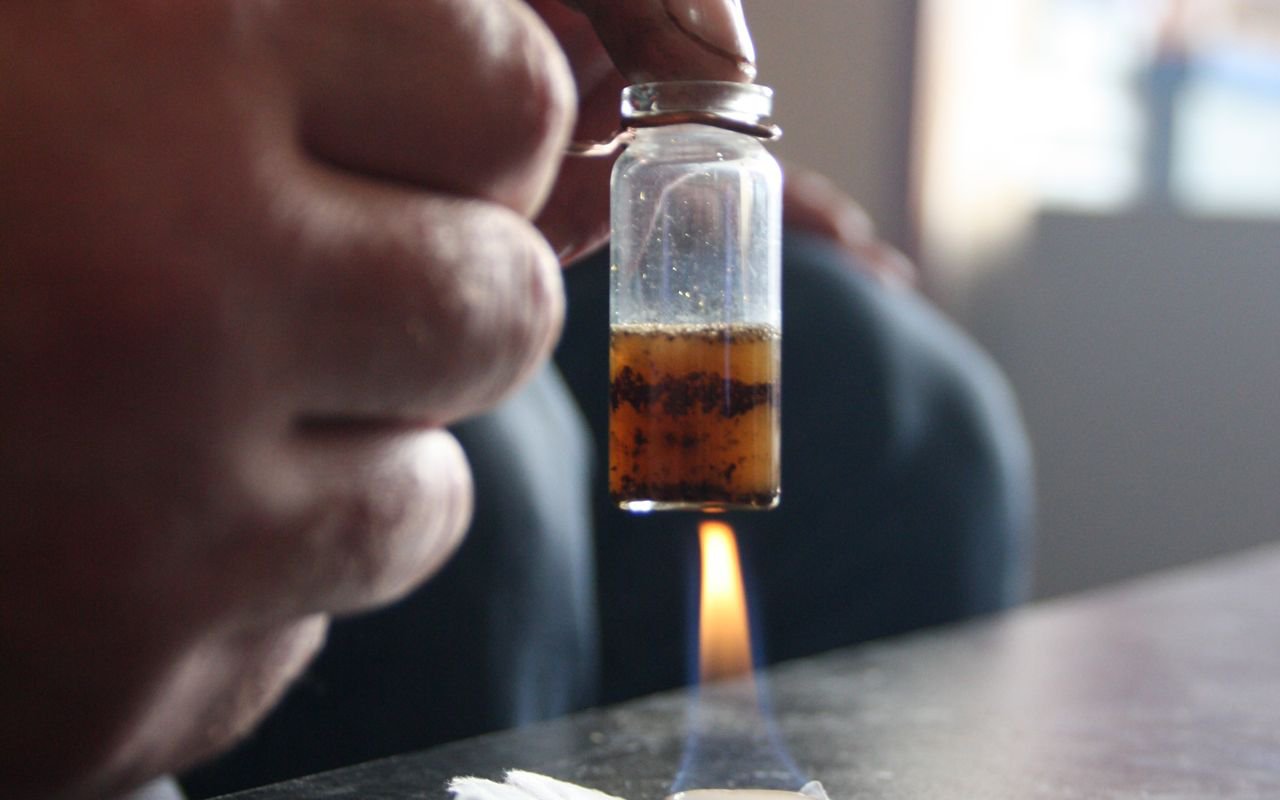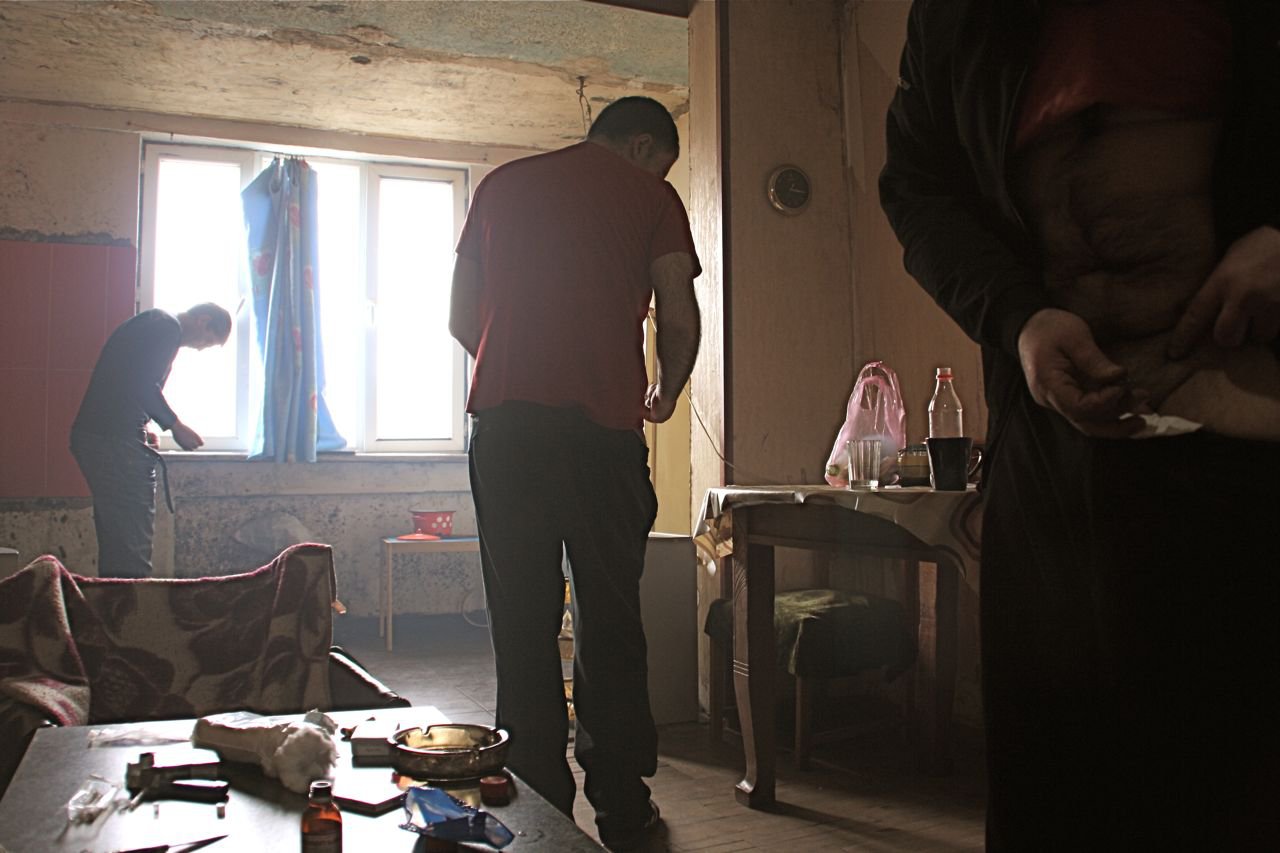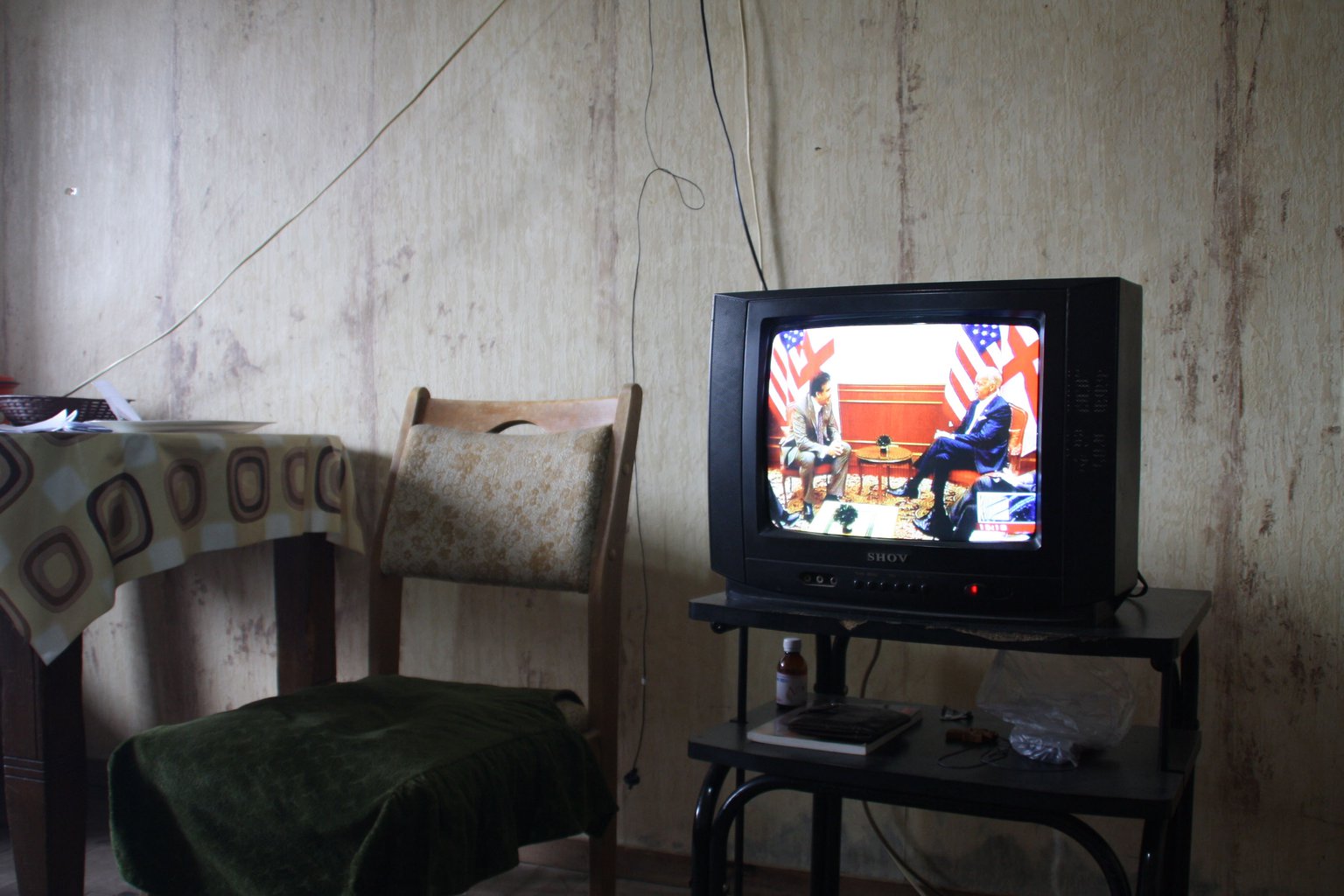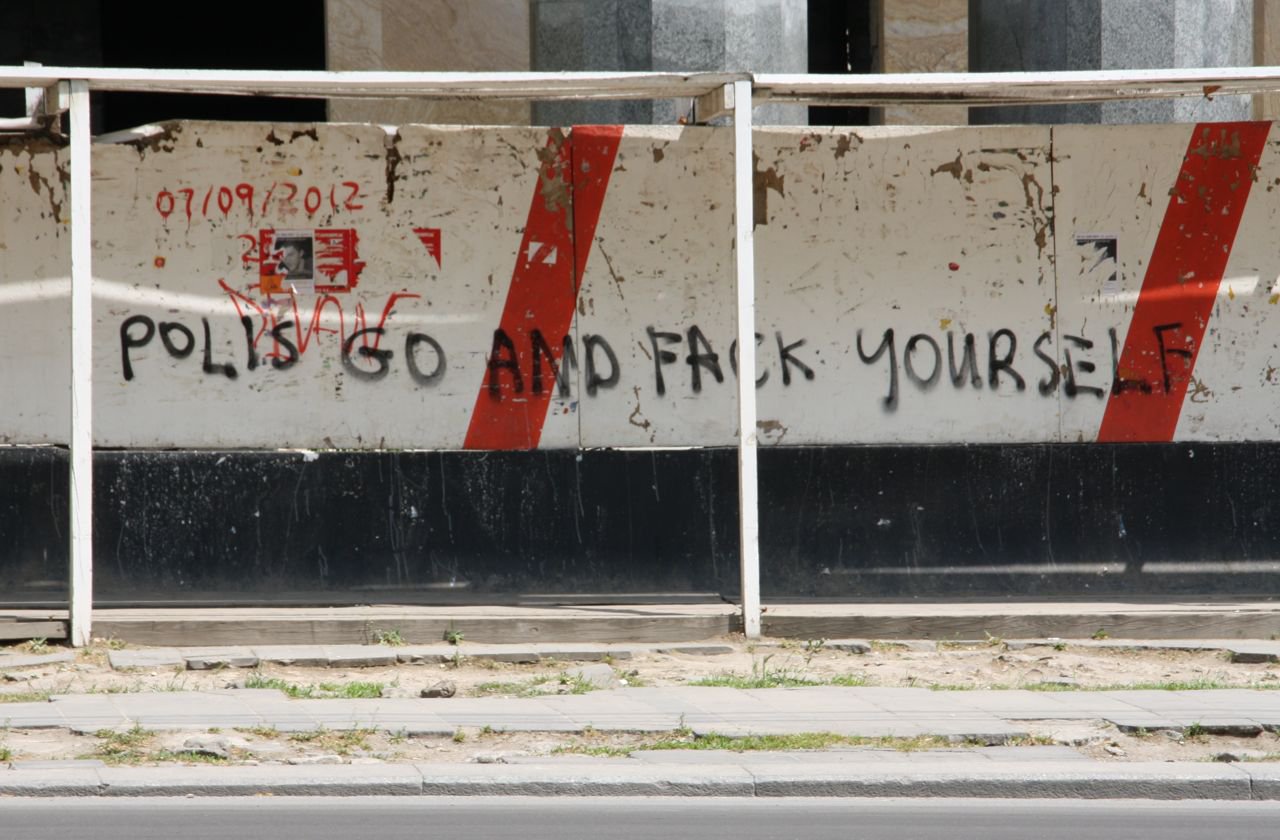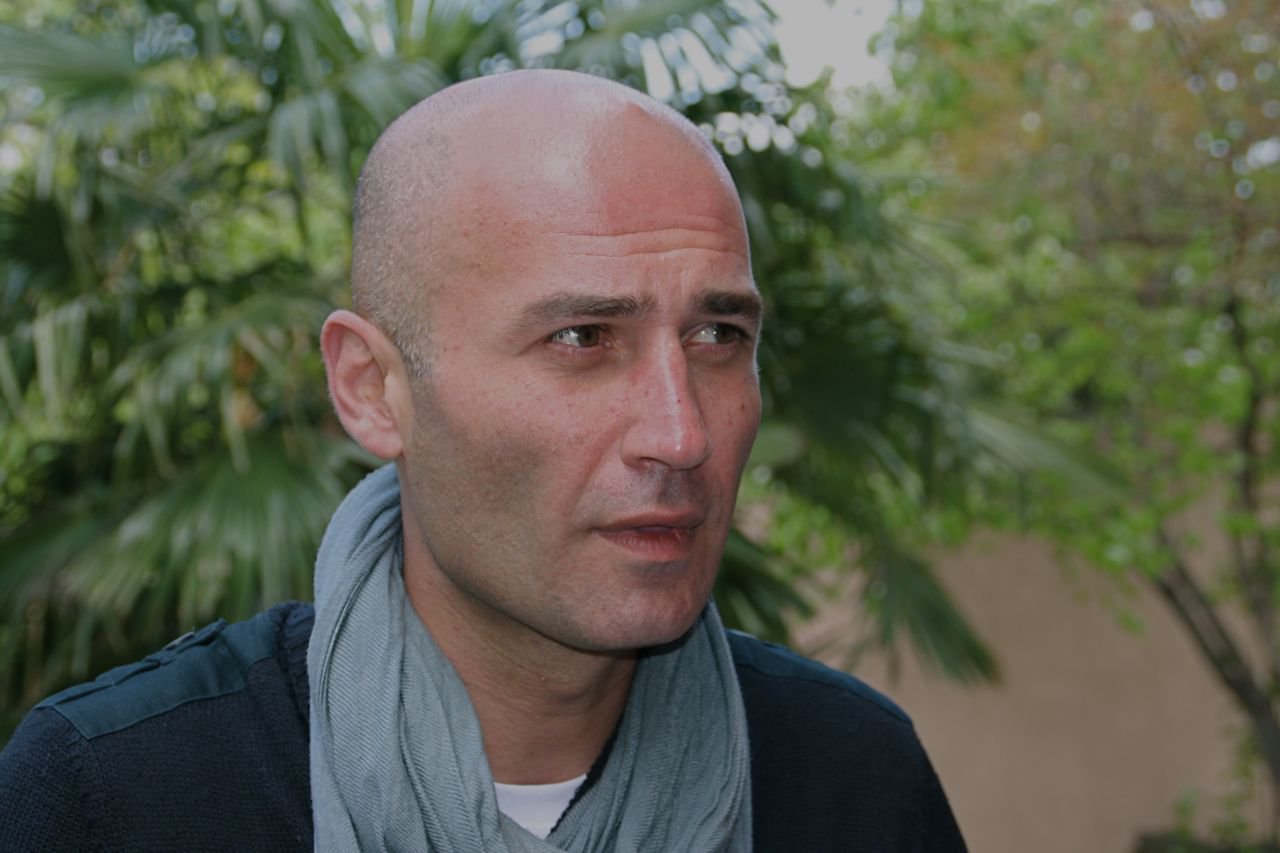Trees are poised to blossom along rows of Soviet blocks of naked concrete in a neighborhood at the edge of Georgia’s capital Tbilisi.
We park the car in a driveway and I exit with Giorgi, an ex-user of codeine-based killer drug Krokodil, who has reimagined himself as a social worker for addicts.
He holds a black plastic bag of fresh needles and alcohol swabs.
We enter the open gash in a block where a door once swung. Inside the corridor one light works, while six others are blown out. We find the lift. Its cabin is deep and nearly pitch-black.
It’s occupied - a father clutches his ten year-old son close. When he sees us entering and speaking Russian, he moves his kid further into the shadow.
The lift will not move. There is a rusty and scratched metal box. It needs two ten-cent Georgian Lari coins to move. I pull these out of my wallet and slot them into the mechanism. The elevator jangles upward. But it will only stop at the tenth floor of 14.
“You have to know,” says Giorgi. “if the police storm the room, everyone inside will be arrested, including you.”
“I don’t think the police are following me,” I reply.
“Don’t worry,” he laughs. “If the police are following you, I will know. I have had experience.”
We leave the lift and mount some concrete steps that rise at the side of the block, giving a view onto the city, framed by the green hills around Tbilisi.
No windows are here. Only the ghost of a wall that leads onto a sharp drop.
On the eleventh floor, we knock on the door. A slight delay. A dark, heavy-set man of 40 years lets us inside. This is Andrei. He pounces on the bag of needles. There are two others - both in their late 30s - Yuri and Boris. We shake hands. All are unshaven, with short hair and dressed in dark Adidas tracksuits.
“Take pictures,” Andrei says. “But no faces.”
An open plan kitchen and living room. The table is scattered with matches, an empty packet of pills and a bottle of drain cleaner Krot, which in Russian means ‘mole’.
A fridge stands with faded stickers of dinosaurs, Spanish striker Raul and Brazilian goalkeeper Claudio Taffarel and a tiny sticker of the five red crosses of the Georgian flag.
The TV is on. Showing the news. Georgian President Mikhail Saakashvili is in Washington DC talking with US vice-president Joe Biden. Obama was busy, it seems, and has dispatched Biden to meet with Georgia’s head of state, probably due to the defeat for Saakashvili’s party in the last parliamentary elections.
“I do not want to be on Krokodil,” says Andrei. “Heroin is much better, but since Saakashvili came to power, we cannot find heroin. I used to take opium, but we cannot find this either - now the only choice is Krokodil.”
Andrei has ground up tablets of Codeine-based pain reliever Codasan into a brown powder. He mixes this with the Krot and half a liter of gasoline in an empty plastic beer bottle.
He says he wants to join a programme of taking heroin substitute Methadone, but it is “too expensive”.
He moves about the room shaking the bottle, while his friend Yuri beckons me over. He has a pile of yellow matchboxes with pictures of zebras. With a razor he is scratching off the side of one, liberating the phosphorus onto a dinner plate.
I ask Yuri about work. If he wants a job.
“There is no work,” he says.
The other men shake their heads.
Yuri mixes around two grammes of the phosphorus with a flammable alcoholic solution, which he lights up. The flames twist across the dinner plate, leaving a dust stuck to the ceramic, which he scratches off with a razor to make a powder.
Andrei shakes the gasoline to separate the pure codeine from the powdered tablets. His arm is aching.
I ask about the costs of the drug cocktail. Andrei looks at all the bottles, clocking up in mental arithmetic the figure.
“Five dollars,” he says, “for each dose.”
Inside the bottle, the gasoline floats to the top, the codeine mix to the bottom. He tips this vertical, allowing the heavy mixture to pour into a second, empty coke bottle.
With Boris holding the base of the beer bottle, Andrei takes a needle to ensure every last drop of the codeine solution is extracted from the mix.
He empties this onto a plate on top of a pan of boiling water and rising steam.
“This,” says Andrei proudly. “should be desomorphine.”
This toxic opiate - an intense version of morphine - is a paste stuck to the plate, which he removes in stripes with a razor. He drops the mixture - similar to a blot of red paint - into a small viol.
Afterwards, the men combine the desomorphine with the black mix of iodine and phosphorus into a solution which they burn on the dinner table over a small flame.
As the red paste dissolves into a clear yellow liquid, the three men look restlessly at the viol. They share this into three small needles.
I am about to ask Andrei a question, when suddenly the men are standing far from each other, Boris by the window, Yuri in the centre of the room and Andrei facing me.
Their tracksuit bottoms are open and each of them are injecting into a vein above the thigh.
They put down their needles and slump into the chairs. Saakashvili is still on television. Still talking to Joe Biden.
The mood is sullen. No euphoria. No relaxation.
“If only we had heroin,” says Andrei.
Before we leave Giorgi looks through the keyhole to check there are no police outside the flat.
“All clear,” he says and, easing open the door, he pushes me out into the corridor, whispering “Go! Go! Go!”
Later as we drive through the streets, he tells me in every block in this area there are two or three apartments with Krodkodil users. The neighbors complain. The police arrest the users. They spend time in prison. But they go back to using.
Heroin fail
Because the Georgian government cracked down on the heroin trade, its sale has collapsed in the country - so tens of thousands of opiate users have turned to Krokodil, a drug popular in Russia for the last decade.
“A user is always looking for a substitute,” says Giorgi. “The moment you get the information that some new drug has appeared that is accessible and cheap, you try it.”
Most users in Georgia he meets are injecting Krokodil five times a day.
“All day you are boiling, injecting, boiling, injecting and nothing else,” he says. “At three o’clock in the morning, you wake up and you need it. You have pain in your head and in your body. You are mad and sweating. After you use it, you calm down and all this pain is gone. But after a year and half, it does not give you a happy mood or relief. All the time you are in depression and this does not change if you use or not.”
A badly mixed batch of Krokodil has gained fame across the ex-Soviet space as a drug which causes oxygen to stop flowing to the extremities of the body.
If wrongly injected under the skin, this can cause a bruising. Giorgi shows me a large black patch around his ankle bone.
“It was almost gangrenous,” says Giorgi. “I went to hospital. The doctors drained the whole tissue.”
Reanimation is possible for users, but amputations are common - and Krokodil users often lose a foot, fingers or a hand.
Giorgi’s outreach programme of clean needles reaches about 700 users, most of whom are between 20 and 40 years old - but he is seeing more teenagers starting to use Krokodil.
“In 15 years of using heroin and opium, I have not seen as many cases of overdosing as in one year of using Krokodil,” says Giorgi.
Users are now finding out how lethal the drug is.
“90 per cent are willing and eager to get on methadone treatment," adds the ex- user. "Everyone would like to get rid of it."
Counting the cost of zero tolerance
Before 2003, Georgia was an embattled and corrupt nation losing control to graft-hungry officials, petty thieves and a heroin epidemic.
At home, in the street and in prison, people were desperate to buy, cook and inject the drug.
Following his victory in the Rose Revolution in 2003, incoming President Mikhail Saakashvili re-engineered his war-torn country as a paradise for a reader of The Economist - with open borders, low regulations and strong policing.
Now the city honors neo-conservative stars of the last decade - a boulevard is named after dead Polish President Lech Kachinski, another after President George W Bush, whose giant smile and waving hand greet drivers on the wall of an underpass from the airport.
This was a time for entrepreneurs looking for a second chance to thrive - anyone could come to Georgia, change their name, become a local citizen and start a business. This led to strong growth, but high unemployment, which stands at 14 per cent.
Meanwhile those deviating from puritan ideals - pickpockets, minor tax dodgers and drug users - were shut up in prison.
Under Saakashvili, police swept users off the streets and judges locked them up. The arms of law and order operated an assembly line of targeting, testing and convicting users in a forced detox.
“The police knew who the users were - they waited for them outside pharmacies, stopped them and took them to a drug lab for a urine test,” says lawyer and project coordinator for NGO Alernative Georgia, Nino Balanchivadze.
At the height of this pressure there were queues of accused users waiting for their turn to urinate in front of a police officer.
Since 2006, around 100,000 have been subject to arrest, detention and forced urine tests - in 2012 alone 25,000 were tested.
"If you were leaning from side to side and looking like a drug user, the police would stop you,” says ex-user Giorgi, who was picked up over 50 times.
The police had quotas of drug users to catch and received incentives to seize as many as possible.
“There is a joke,” says Giorgi. “Two policemen in Tbilisi are sitting in a car. One sneezes. Instead of saying ‘to your health’, the other policeman says ‘I hope you catch a lot of junkies’.”
In terms of prosecution, there was little discrimination between personal use and trafficking, with 1,600 people criminalised annually for up to 20 years, even on possession charges.
By 2012, Georgia’s prisons were hosting 24,500 inmates - a rate higher than Cuba, Belarus or Russia and the highest in the world of a major country after the USA. Around 3,000 from this figure were arrested for drug possession and consumption.
Georgian prison leaders said prison was an effective method to combat addiction because inmates had no contact with drugs.
Dealers now rarely exist on the street. Heroin is not available. Neither is poppy, which users can cook into a home-made heroin, popular in Ukraine.
Instead around two-thirds of injecting users are using Krokodil, the remainder are regular users of stimulant Vint - a home-made injectable drug using ephedrine from cold and flu remedies - a cheap Russian version of Meth.
Users can buy the ingredients to make these drugs from pharmacies. Cold and flu drug Actifed became the fourth biggest selling drug in Georgia in 2009, possibly boosted by users of Vint.
Meanwhile pawn shops appeared around the corner from pharmacies so users could sell off their belongings to buy toxic cough medicine.
Addicts say that now there is only one drug dealer in Georgia - the pharmacy.
However Saakashvili’s party has lost control of the Parliament and following the research for this article, his chosen candidate for President will fail to win the election.
Therefore the country is experiencing an aftermath of a decade-long war on drug users.
A war it has lost.
In 2009 there were 40,000 injecting drug users in Georgia, according to NGO Alternative Georgia, while in 2012, there were 45,000 - a 13 per cent rise.
Meanwhile nine out of ten users prosecuted for possession returned to drug consumption after a year.
“Now we have a picture of how restriction and fear of imprisonment does not work,” says senior researcher at Alternative Georgia Irma Kirtadze.
Georgia’s new Government has drawn up an action plan to combat the rising number of drug users.
But the new powers do not want the reputation of going soft on a part of society that much of Georgia’s population has come to despise.
“We will keep the severe policy of sanctions under criminal law for traffickers,” says Justice Minister Tea Tsulukiani, who chairs an interagency council on drugs. “We are determined to continue communicating with the young generation that using drugs is not something which they can be proud of.”
But she wants to change the prosecution of the users.
“We intend something revolutionary,” she says, “not to decriminalize drug use, but to depenalize it - to reduce sentences for those who are simple users.”
NGOs believe a combination of treatment for sufferers and social assistance would reduce drug use.
“There is an imbalanced policy in favor of law enforcement with no treatment,” says lawyer Nino Balanchivadze. “Drug use comes out of boredom. There are not a lot of places to have fun and there are few job opportunities in Georgia.”
Registered drug users cannot drive a vehicle or work in the public sector - and with 50 per cent of Georgia’s workforce employed by the state, this limits their job prospects by half before they even start looking for employment.
Junkie palace
On a street near the main city hospital, a three-story nineteenth century villa with palm trees in the garden provides counseling, needle exchange and dentistry for addicts.
The New Vector drop-in centre is an open plan space which a mix of older and younger users and ex-users occupy as a chill-out zone to get help on how to quit.
Inside one user is playing patience on a computer, while in the meeting room a whiteboard shows a two-dimensional drawing of the petals of a daisy, next to the words in English - ‘this is a flower’ and ‘these are the flowers’ - the traces of a language lesson.
The building is known in the users’ parlance as the Junkie Palace.
Giorgi works at the centre while continuing his programme of methadone, a substitute drug he strongly advocates.
“I wake up and I have something to do,” he says. “I do not feel I am only a person who can prepare drugs and inject. I feel I can do something else - aid others - this helps you to quit and to deal with depression.”
In Georgia around 500 drug users have free access to Methadone, while a further 1,500 must pay for the opiate substitute.
Users sometimes can afford the drug one month, but not another and they interrupt their programme. The best option would be for methadone to be free for everyone, says Koka Labartkava, manager of New Vector.
The Justice Minister wants to put the emphasis on medical treatment and rehabilitation.
“Either you are a user and go through medical treatment that is affordable or you are a trafficker and you go to jail under criminal law, but you will also be treated medically,” she says.
Because users can easily access the source drugs from pharmacies, one idea is to restrict their sale with greater rigor. But expert Koka is sceptical this would work.
In 2006, when the heroin market dried up, dealers smuggled into Georgia the opioid substitute Subutex. Once the police cracked down on the Subutex trafficking, cold and flu tablet-based stimulant Jeff became popular.
However when it became clear that Jeff could bring on the symptoms of Multiple Sclerosis, users switched to Vint and Krokodil.
“If the pharmacies stop selling drugs, users will always find something else, but much worse,” says ex-user George. “We are very creative.”
With communication between states open, generations of heavy drug users sharing their experience, information available online and products bought via the Internet or in the drugstore, policy-makers feel they are fighting curiosity.
“You can misuse coffee and get ill,” says Tsulukiani. “You cannot follow every imagination of the human being. But we need a real state policy against drugs and to minimize our citizens' need to imagine solutions [for creating drugs].”
Giorgi feels he knows where the blame lies.
Recently he organized a protest in front of the Russian Embassy, where he attacked his neighbour as the source of Krokodil and berated Russia for its lack of a methadone programme and free syringe distribution.
“We were chanting ‘Shame Russia! Shame Russia!’” he says. “30,000 people died in Russia due to Krokodil. We wanted to express our solidarity with the victims with this protest.”
But he concedes that this demonstration was not against trafficking, dealing or the cultivation or production of drugs.
Instead it was a new kind of protest - one that targeted the sharing of cooking and injecting skills.
“And that information on how to use,” he says, “comes from Russia.”
- For more on our reporting from Georgia, read Paralyzed by home-made alternative to Heroin
and Smack in the USSR: How injecting drugs in the Soviet Union was socializing
- Parts of the necessary process to create Krokodil have been removed from this article so that it does not act as a guide to cooking the drug.
- The drug user names have been changed.
- Thanks to all those quoted above - as well as Minister Archil Talakvadze, Mariam Skhiladze, Ekuna Lolua, Dave Bloss, Dr Dato Otiashvili, everyone at the New Vector clinic, Nanka Nashidashvili and the staff at Monitor and Akaki Gogichaishvili for making this article possible.
